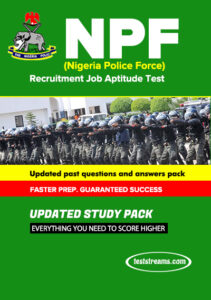Nigeria Police Force Past Questions and Answers -Updated(Pdf Download)
Preparing for the Nigeria Police Force recruitment exam can be a daunting task, especially with the high competition and the rigorous selection process. To succeed, candidates must equip themselves with the right tools, including past questions and answers that provide an insight into the exam format and help in the identification of crucial areas of study. This blog post aims to serve as a comprehensive guide for candidates looking to excel in the Nigeria Police Force recruitment examination, providing access to a valuable collection of past questions and expertly crafted answers for effective preparation.
Success in the Nigeria Police Force recruitment examination demands meticulous preparation, a strong understanding of various subjects, and the ability to think critically and logically. By utilizing past questions and answers as a key component of their study plan, candidates can significantly enhance their chances of performing well in the exam. Additionally, leveraging online resources and expert tips can further streamline the preparation process, ensuring a comprehensive and effective approach to achieving success in this crucial assessment.
About the Nigerian police force
The Nigeria Police Force is the principal law enforcement agency in the country. It had its origins in Lagos following the creation of a 30-man Consular Guard in 1861. The small guard was subsequently expanded to 600 men in 1891 and renamed “Hausa Police”, because of the enlistment of some captured run-away Hausa slaves at Jebba by Lt. Glover R. N. Again in 1879 the Hausa Police was further enlarged by the recruitment of more men and renamed the “Hausa Constabulary”. It then consisted of 1,200 officers and men commanded by an Inspector-General of Police.
The duties of the Hausa Constabulary entailed attending to security needs of the colonial administration which encompassed both military and civil police functions. It however, was largely military in character and posture, one of such military duties was the provision of a detachment of 8 officers and 51 men for the Arochukwu expedition.
On January 1, 1896, the Lagos Police Force was established. Like the Hausa Constabulary, the Force was armed and consisted of a Commissioner of Police, 2 Assistant Commissioners, 1 Superintendent, 1 Assistant Superintendent, a Pay Master, Quarter Master, Master Tailor and 250 other ranks. The Force operated mainly in the Lagos area, while the “Hausa Constabulary” was in the hinterland.
A similar Force, the Niger Coast Constabulary was formed in Calabar in 1894 under the newly proclaimed Niger Coast Protectorate. It was modeled after the Hausa Constabulary but with emphasis on the military role. During its six years of existence, the force mainly engaged in active service and formed part of the major expedition against Benin in 1896.
When the protectorate of Northern and Southern Nigeria were proclaimed in the early 1900s, part of the Royal Niger Constabulary became the Northern Nigeria Police and part of the Niger Coast Constabulary became the Southern Nigeria Police.
During the colonial period, most police were associated with Local Governments (Native Authorities). However, in the 1960s, under the First Republic, these forces were first regionalized and then nationalized. The British merged Lagos colony and the Southern and Northern Protectorates in 1914 and named the new colony Nigeria. The Northern and Southern Regional Police Forces were later merged in 1930 to form the colony’s first National Police.
Sections 214 to 216 of the 1999 Constitution of Nigeria provides for the Nigeria Police Force. Section 214 of the 1999 Constitution (As amended) categorically states that, “There shall be a Police Force for Nigeria, which shall be known as the Nigeria Police Force, and subject to the provisions of this section, no other police force shall be established for the Federation or any part thereof”. The Police Act, however, regulates the Force. Section 4 of the Police Act provides that, ‘ “The Police shall be employed for the prevention and detection of crime, the apprehension of offenders, the preservation of law and order, the protection of life and property and the due enforcement of all laws and regulations with which they are directly charged�”
Officers and men of the Force are deployed across the 36 states of the Federation and the Federal Capital Territory (FCT), Abuja to fight crimes, criminality and ensure the maintenance of law-and-order vis-a-vis peaceful co-existence in the society.
The operational command and control of the Nigeria Police Force is under the Inspector General of Police. Section 215 (1) (a) of the Nigerian Constitution states that, “There shall be an Inspector-General of Police, who, subject to section 216(2) of this Constitution shall be appointed by the President on the advice of the Nigeria Police Council from among serving members of the Nigeria Police Force”
For administrative ease, the Force is divided into seven (7) Departments. There is the Department of Finance and Administration; Department of Operations; Department of Logistics and Supply; Force Criminal Investigation Department; Department of Training and Development; Research and Planning; and Information and Communication Technology Department. Each of the seven Departments is headed by a Deputy Inspector General of Police, supported by an Assistant Inspector-General of Police. The Force is further divided into 17 operational Zonal Commands. Each Zonal Command is headed by an Assistant Inspector-General of Police with two, three or four state commands under the AIG to superintend. The 36 States of the Federation including FCT, Abuja have Police Commands headed by Commissioners of Police. The State Police Commands have Area Commands, Divisions and Police Outposts. The Area Commands are manned by Assistant Commissioners of Police. The Police Divisions are headed by Divisional Police Officers between the Ranks of DSP to CSP. The Police Outposts are headed by ASPs and Inspectors. This decentralization of the Police structures is to ensure adequate protection of lives and properties.
NPF personnel have track records of peacekeeping operations and are well respected and recognized for their exploits in contributing to global peace and security. On the home front, they play the lead role in the internal security management of the country within the constitutional framework and the Police Act.
How to apply for 2023 recruitment into Nigeria Police Force
The Police Service Commission in conjunction with the Nigeria Police Force has announced the beginning of recruitment of interested and qualified Nigerians for enlistment into the force as constable (recruits).
The bulletin further indicates that prospective applicants are required to complete the online application forms and submit them within the specified period via www.apply.policerecruitment.gov.ng. The portal is open to both male and female.
General requirements
1. Applicants are expected to be of Nigerian origin by birth
2. Possess the National Identification Number
3. Possess a minimum of four credits in not more than two sittings one WASSCE/SSCE or its equivalent with credit in English and Mathematics.
4. The age of applicants must be between 18-25 years, they must be medically, physically, and psychologically fit, and must not be less than 1.67m tall for male and 1.64m tall for female.
5. Female applicants must not be pregnant at the time of entry; applicants must have a valid email address and phone number and SSCE statements of results or certificates relating to examinations taken before 2014 will not be accepted.
Also, it was stated that the invitation of applicants will be only for those who meet the online registration requirements for the automated physical screening exercise, which will be conducted nationwide, on a date to be communicated later.
How to apply
1. Visit www.apply.policerecruitment.gov.ng with NIN, email, and phone number.
2. Fill out the application form
3. Upload your O’level results, Birth, and Certificate of Origin
4. Print the completed online form, guarantor form and submit same at the physical or credential screening exercise.
Pattern of Nigeria Police Force Past Question and Answers
It is 100% multiple-choice and We have made it very easy for you. we bring all the questions for many years and put them together. We provide the correct answers in order to save your time. All you need to do is to devote quality time to study the Past Questions for best performance in your test.
The test sections include:
- Quantitative reasoning questions (MATHS)
- Verbal Reasoning (ENGLISH)
- Current affairs.
- General knowledge
Sample Nigeria Police Force Recruitment Test Past Questions
Below are sample of Nigeria Police Force Past Questions and Answers
Select the correct answer from the following options lettered A-D
Based on Nigeria Police Force Past questions, the questions will be based on Mathematics, English Language, and General paper. There would be 25 Mathematics questions, 25 English Language questions, Current affairs 25 and 25 General paper questions; that’s a total of 100 questions in all. All questions are to be answered within 1 hour.
MATHEMATICS
What is the value of 3x + 5 when x = 4?
A 12
B 17
C 9
C 15
Answer: B 17
If the square root of a number is 6, what is the number?
A 12
B 36
C 18
D 6
Answer: B 36
What is the product of 5 and 7?
A 35
B 12
C 42
D 11
Answer: A 35
What is the value of 8 – (4 + 2) ÷ 2?
A 5
B 3
C 6
D 7
Answer: B 3
If the perimeter of a square is 40 cm, what is the length of one side?
A 10 cm
B 20 cm
C 40 cm
D 15 cm
Answer: A 10 cm
What is 30% of 200?
A 30
B 60
C 70
D 90
Answer: B 60
Solve for x: 3x + 12 = 30
A 6
B 7
C 9
D 18
Answer: C 9
What is the value of 4² + 3²?
A 16
B 12
C 25
D 10
Answer: C 25
If a car travels at a speed of 60 km/h for 2 hours, how far does it travel?
A 120 km
B 100 km
C 150 km
D 130 km
Answer: A 120 km
If the cost of 5 apples is ₦100, what is the cost of 8 apples?
A ₦160
B ₦180
C ₦140
D ₦200
Answer: A ₦160
ENGLISH LANGUAGE
Which word is most similar to “Enormous”?
A Tiny
B Big
C Small
D Minute
Answer: B Big
Choose the word that is the opposite of “Brave”?
A Fearless
B Courageous
C Timid
D Bold
Answer: C Timid
What is the meaning of the word “Diligent”?
A Careless
B Lazy
C Hardworking
D Inactive
Answer: C Hardworking
Choose the word that best fits the sentence: “He was ______ by the news of his promotion.”
A Elated
B Depressed
C Frightened
D Annoyed
Answer: A Elated
Select the word that does not belong in the group: Apple, Banana, Orange, Mango, Carrot
A Apple
B Banana
C Mango
D Carrot
Answer: D Carrot
What does the idiom “To hit the nail on the head” mean?
A To hurt oneself
B To be precise
C To miss the target
D To avoid confrontation
Answer: B To be precise
Choose the word that is a synonym of “Eager”:
A Indifferent
B Excited
C Calm
D Reluctant
Answer: B Excited
What is the meaning of the phrase “Break the ice”?
A To create conflict
B To form an alliance
C To initiate a conversation
D To avoid confrontation
Answer: C To initiate a conversation
Choose the word that best fits the sentence: “The situation was extremely ______, causing great distress among the villagers.”
A Amusing
B Puzzling
C Alarming
D Boring
Answer: C Alarming
Select the word that is a synonym of “Abundant”:
A Scarce
B Plentiful
C Limited
D Sparse
Answer: B Plentiful





